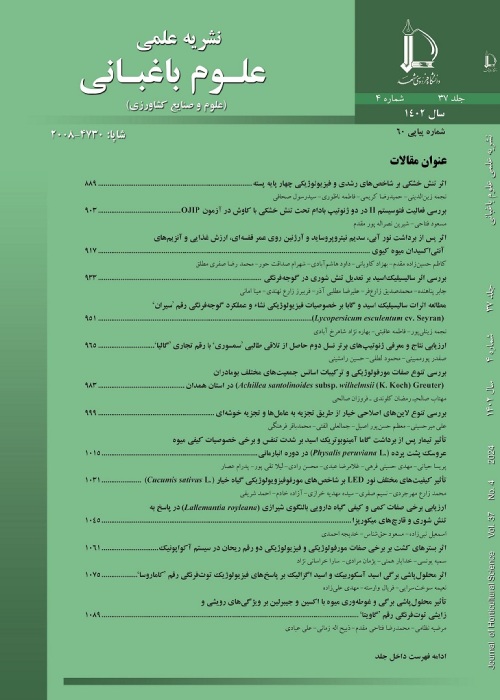The Role of Melatonin on Postharvest Properties of Sweet Cherry Fruit cv. Siah Mashhad during Storage
Cherry fruit has a high nutritional value and because of its favorable taste, its attractive appearance is of great importance. Iran is the origin of many horticultural products, especially cherries. The quality and quantity of the Iranian cherry crop are much more suitable in comparison with other producing countries due to suitable climatic conditions and significant areas under cultivation. This fruit has a very short shelf life due to its susceptibility to transport damage. After harvest, the cherry fruit decays quickly and in some cases, due to the time of transfer and marketing, does not reach consumers with good quality. Therefore, the use of natural compounds to increase shelf life and maintain its quality seems necessary inlcuding lower moisture, and perishability. On the other hand, storage of products involves a series of biochemical changes that take place, which is accompanied by softening of the fruit, destruction of the cell wall, and reduction of the external and internal quality of the products. Therefore, the use of appropriate compounds to increase durability and maintain its quality seems necessary. Phytohormonal treatments such as melatonin increase the cold resistance of fruits during storage and reduce the development of mechanical damage in the refrigerator during fruit storage. Melatonins have an amphiphilic indole ring structure, through which they can easily move out of the cell and play a role in the structure of the cell wall or membrane. Besides, melatonin is structurally similar to auxin and has similar effects, helping to maintain cell wall structure under stress and reducing the denaturation of cell wall proteins. Melatonin is also known as a biostimulant. These biostimulants in plants affect the production of secondary metabolites, biosynthesis of various phytohormones, facilitate plant uptake of nutrients, stimulate growth, and increase product quality and quantity. Melatonin, in interaction with other signaling agents, increases fruit metabolism and induces stress resistance.
In the present study, cherry fruits were harvested from the commercial garden at full maturity and after washing with distilled water with zero melatonin (control), 50, 100, 200 micromolar were treated by immersion for 5 minutes and Store at 1.5 with a relative humidity of 85% for 35 days. Parameters such as weight loss, titratable acidity, organic acids, soluble solids, antioxidants (DPPH), phenolic compounds, anthocyanin content, peroxidase, and ascorbate peroxidase activity were examined per week.
The results indicated that fruits treated with 200 μM melatonin showed less weight loss than other treatments and controls, and melatonin prevented fruit water loss, as well as of phenolic compounds, titratable acidity, soluble solids. The activity of peroxidase and ascorbate peroxidase enzymes have all increased. These compounds preserve the fruits during storage and increase the oxidation resistance. Melatonin coating on cherry fruit and can protect cells from stress by raising antioxidant levels. Consumption of edible coatings on horticultural products such as fruits increases durability and marketability. Edible coatings reduce fruit rot and prevent microbial growth on their surface. These coatings have a positive effect on physical properties and reduce physiological activity. Oral coatings better preserve organic acids by changing the internal atmosphere and slowing down the respiration of the fruit.
The use of exogenous compounds or growth regulators has in many cases been effective in reducing the effects of environmental stresses. These results show that the combination of melatonin has high antioxidant properties and can act as a protective compound and inhibit free radicals. Besides, it acts as a signaling molecule at the cellular level and manages antioxidant activity, thus preventing membrane damage and lipid peroxidation of the membrane. Melatonin also increases plant tolerance to environmental stresses and follows this mechanism by regulating gene expression in various horticultural crops. The use of melatonin improves the process of coping with oxidative stress by further regulating the biosynthesis of anthocyanins and the antioxidant-encoding gene.Decomposition of cell wall compounds may increase total soluble solids, melatonin reduces the process of wall destruction, and preserves the appearance of the fruit. Increasing the amount of soluble solids increases the total antioxidant, phenolic and increases the activity of antioxidant enzymes. Melatonin is also at the forefront of stress management, and other antioxidants act as support after melatonin. Melatonin can prevent further stress damage by activating the plant signaling pathway.
- حق عضویت دریافتی صرف حمایت از نشریات عضو و نگهداری، تکمیل و توسعه مگیران میشود.
- پرداخت حق اشتراک و دانلود مقالات اجازه بازنشر آن در سایر رسانههای چاپی و دیجیتال را به کاربر نمیدهد.



